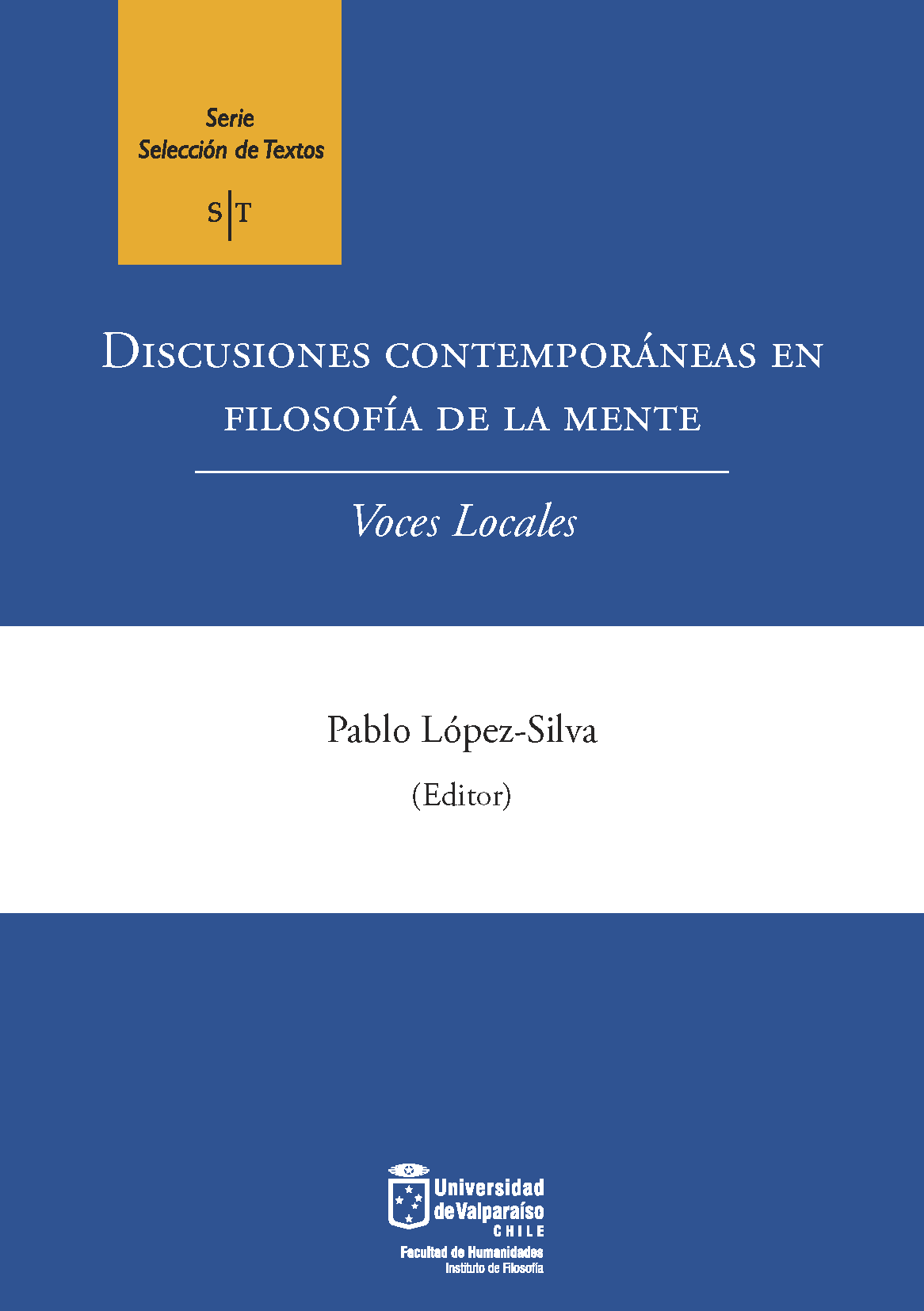El camino no elegido: indiferencia ontológica en la filosofía de la mente
DOI:
https://doi.org/10.22370/sst.2019.7.4962Palabras clave:
problema mente-cuerpo, materialismo, ciencias de la mente, procesos, estadosResumen
El problema mente-cuerpo —esto es, la pregunta sobre cómo la mente existe en la naturaleza espacio-temporal— ha dominado buena parte de la filosofía de la mente del siglo XX. El objetivo de esta contribución es sugerir que esta tradición filosófica ha sufrido de cierta indiferencia hacia importantes preguntas sobre la estructura ontológica de nuestros fenómenos mentales. Para concluir, esbozaré cómo un renovado interés en la ontología de la mente está replanteando el hasta ahora estancado problema mente-cuerpo.
Descargas
Referencias
Armstrong, D. (1968). A Materialist Theory of the Mind. London: Routledge and Kegan Paul.
Block, N. (1978). Las Dificultades del Funcionalismo. En E. Rabossi (ed.), Filosofía de la Mente y Ciencia Cognitiva pp. 105-142. Barcelona: Paidos.
Broad, C.D. (1937). The Mind and its Place in Nature. London: Rutledge and Kegan Paul.
Chalmers, D. (1996/1999). La Mente Consciente. Barcelona: Gedisa.
Crowther, T. (2009a). Watching, sight, and the temporal shape of perceptual activity. Philosophical Review, 118(1): 1-27.
Crowther, T. (2009b). Perceptual Activity and the Will . En L. O’Brien y M. Soteriou (eds.), Mental Actions, pp. 173-191. Oxford: Oxford University Press.
Crowther, T. (2011). The Matter of Events. The Review of Metaphysics, 65(1): 3-39.
Davidson, D. (1970). Eventos Mentales. En D. Davidson (ed.), Ensayos sobre Acciones y Sucesos. Barcelona: Crítica.
Dennett, D. (1969/2010). Content and Consciousness. Milton Park: Routledge.
Dennett, D. (1995). La Conciencia Explicada: Una teoría interdisciplinar. Barcelona: Paidós.
Guttenplan, S. (1994). A Companion to the Philosophy of Mind. Cambridge: Blackwell.
Dennett, D. C. (1991/2013). Intuition pumps and other tools for thinking. New York: WW Norton & Company.
Descartes, R. (1642/1977). Meditaciones Metafísicas. Madrid: Ediciones Alfaguara.
Descartes, R. (1999). Correspondencia con Isabel de Bohemia y otras cartas. Barcelona: Alba Editorial.
Farrell, B. A. (1950). Experience. Mind, 59(234): 170-198.
Feigl, H. (1967). The mental and the physical: The essay and a postscript. Minneapolis: University of Minnesota Press.
Gill, K. (1993). On the metaphysical distinction between processes and events. Canadian Journal of Philosophy, 23(3): 365-384.
Kim, J. (1988/2002). El Problema Mente-Cuerpo tras Cincuenta Años. Azafea, 4: 45-63.
Kripke, S. (1981./1995). El Nombrar y la Necesidad. México: Instituto de Investigaciones Filosóficas UNAM.
Lewis, D. (1980). Mad Pain and Martian Pain. En N. Block (ed.), Readings in the Philosophy of Psychology, vol. I, pp. 216-222. Cambridge: Harvard University Press.
Mourelatos, A. P. (1978). Events, processes, and states. Linguistics and philosophy, 2(3): 415-434
Mourelatos, A. P. (1993). Aristotle’s kinesis/energeia distinction: A marginal note on Kathleen Gill’s paper. Canadian Journal of Philosophy, 23(3): 385-388.
O’Shaughnessy, B. (1971). The Temporal Ordering of Perceptions and Reactions. En F. Sibley (ed.), Perception: A Philosophical Symposium, pp. 139-187. London: Methuen.
O’Shaughnessy, B. (1972). Processes. Proceedings of the Aristotelian Society, 72: 215-240.
O’Shaughnessy, B. (2000). Consciousness and the World. Oxford: Clarendon Press.
Place, U. T. (1956). Is consciousness a brain process? British Journal of Psychology, 47: 44-50.
Putnam, H. (1967/1981). La Naturaleza de los Estados Mentales. México: Instituto de Investigaciones Filosóficas UNAM.
Putman, H. (1988/1990). Representación y realidad. Barcelona: Gedisa.
Rothstein, S. (2008). Structuring Events. A Study in the Semantics of Lexical Aspect. Malden: Blackwell Publishing.
Ryle, G. (1949). The Concept of Mind. London: Hutchinson. Ryle, G. (1954). Dilemmas. Cambridge: Cambridge University Press.
Ryle, G. (1956). Sensation. En G. Ryle (ed.), Collected Papers, vol. 2., pp. 349-362. London: Hutchinson.
Searle, J. R., Willis, S. (1983). Intentionality: An essay in the philosophy of mind. Cambridge University press.
Shoemaker, S. (2003). Identity, Cause, and Mind: Philosophical Essays. Oxford: Clarendon Press.
Skinner, B. F. (1951/2014). Science and Human Behavior. Cambridge: The B.F. Skinner Foundation.
Smart, J. J. (1959). Sensations and brain processes. The Philosophical Review, 68(2): 141-156.
Soteriou, M. (2007). Content and the Stream of Consciousness. Philosophical Perspectives, 21: 543-568.
Soteriou, M. (2011). Occurrent perceptual knowledge. Philosophical Issues, 21: 485-504.
Soteriou, M. (2013). The mind’s construction: The ontology of mind and mental action. Oxford University Press.
Steward, H. (1997). The Ontology of Mind. Oxford: Clarendon Press.
Steward, H. (2011). Perception and the Ontology of Causation. En N. Eilan, H. Lerman, y J. Roessler (eds.), Perception, Causation and Objectivity: Issues in Philosophy and Psychology, pp. 139-160. Oxford: Oxford University Press.
Steward, H. (2013). Processes, continuants, and individuals. Mind, 122(487): 781-812.
Steward, H. (2015). What Is a Continuant? Aristotelian Society Supplementary Volume, 89(1): 109-123.
Stout, R. (1997). Processes. Philosophy, 72(279): 19-27. Stout, R. (2016). The Category of Occurrent Continuants. Mind, 124(496): 41-62.
Stout, R. (2018). Process, Action and Experience. Oxford: Oxford University Press.
Taylor, B. (1977). Tense and continuity. Linguistics and philosophy, 1(2): 199-220.
Van Fraassen, B. C. (2002). The Empirical Stance. New Haven: Yale University Press.
Vendler, Z. (1957). Verbs and times. The philosophical review, 66(2): 143-160.
Wittgenstein, L. (1953). Investigaciones Filosóficas. En L. Wittgenstein (ed.), Tractatus Logico-Philosophicus. Madrid: Tecnos.
Descargas
Publicado
Número
Sección
Licencia

Esta obra está bajo una licencia internacional Creative Commons Atribución-NoComercial-SinDerivadas 4.0.

